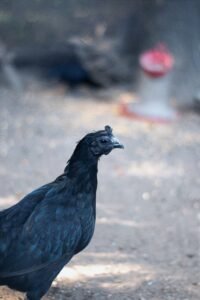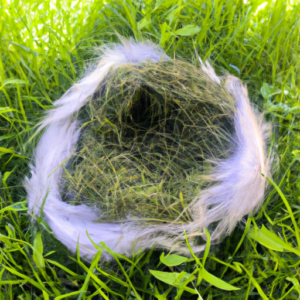
During the winter months, it’s important to ensure that your chickens are receiving the ideal diet to keep them healthy and thriving. With colder temperatures and less access to fresh vegetation, their nutritional needs may change. Providing a balanced diet that includes a combination of grains, high-quality poultry feed, and additional protein-rich treats can help support their immune system, maintain feather health, and ensure optimal egg production. In this article, we will explore some key considerations when it comes to the ideal diet for chickens during the winter months, helping you keep your feathered friends happy and well-nourished.

Preparing for Winter
Winter can be a challenging time for chickens, as the cold weather and limited food resources can put a strain on their health. However, with proper preparation, you can ensure that your flock stays happy and healthy throughout the season. In this article, we will guide you through the essential steps to prepare your chickens for winter.
Assessing Nutritional Needs
The first step in preparing your chickens for winter is to assess their nutritional needs. During the colder months, chickens require additional energy and nutrients to stay warm and maintain their overall health. It is crucial to adjust their diet accordingly to meet these increased requirements.
Adjusting Feed Quantity
To meet the increased nutritional needs of your chickens during winter, you should adjust the quantity of feed you provide. Increasing their daily feed intake will ensure they have enough energy to maintain their body temperature and support their overall health. Monitor your flock’s weight and adjust the feed quantity accordingly.
Providing Adequate Hydration
While it may seem counterintuitive, chickens require ample hydration even in winter. Water is vital for their digestion, egg production, and overall well-being. Make sure to provide fresh, unfrozen water at all times. Consider using heated waterers or checking the water frequently during colder periods to prevent freezing.
Maintaining a Balanced Diet
A balanced diet is key to supporting your chickens’ health and immune system during winter. Here are some important factors to consider when it comes to their diet:
Protein Requirements
Protein is essential for muscle development, feather growth, and overall health. During winter, chickens may need a higher protein intake to cope with the cold. Consider adding protein-rich foods like mealworms or high-quality poultry feeds that are specifically formulated for cold weather.
Energy Requirements
To generate body heat and maintain their core temperature, chickens need increased energy intake during winter. Carbohydrates and fats are excellent sources of energy. You can provide them with whole grains such as corn or wheat to supplement their diet and help them stay warm.
Vitamin and Mineral Supplements
Fresh greens and insects, which are abundant in warmer months, may be scarce during winter. To compensate for the lack of these natural sources, consider providing your chickens with vitamin and mineral supplements. These supplements will help ensure that they receive all the necessary nutrients to stay healthy.

Winterizing the Coop
The coop is the safe haven for your chickens during the winter months. To protect them from the cold and maintain a comfortable environment, it is essential to winterize their coop. Here are some key steps to follow:
Insulating the Coop
Proper insulation is crucial to retain heat and prevent drafts inside the coop. Check for any cracks or openings that could let cold air in and ensure they are sealed. Insulate the walls and roof using materials like straw, hay, or insulating foam boards. This will help retain warmth and protect your flock from temperature extremes.
Adding Extra Bedding
Extra bedding provides insulation and helps maintain a comfortable temperature inside the coop. Layer the floor with deep bedding, such as straw or wood shavings, to create a cozy and warm environment. Consider refreshing and adding more bedding regularly to keep it dry and odor-free.
Ensuring Ventilation
While it may seem counterintuitive, proper ventilation is crucial for maintaining good air quality and preventing moisture buildup inside the coop. Ensure that there are adequate vents or windows to allow fresh air to circulate. However, remember to position them in a way that prevents direct drafts from reaching the chickens.
Feeding Strategies
In addition to adjusting their diet, implementing specific feeding strategies can further support your chickens’ well-being during winter. Consider the following approaches to enhance their nutrition:
Offering Warm Foods
During cold winter days, providing warm foods can help raise your chickens’ body temperature. Serve warm oatmeal, cooked grains, or scrambled eggs. These foods not only provide warmth but are also nutrient-dense, ensuring your flock receives the necessary energy to stay healthy.
Feeding Scratch Grains
Scratch grains, like cracked corn or sunflower seeds, can be an excellent addition to your chickens’ winter diet. These grains provide extra energy and help keep them occupied, as the process of scratching for food stimulates their natural foraging behavior. However, it is important to note that scratch grains should be offered in moderation, as excessive consumption can lead to nutritional imbalances.
Including Grit in the Diet
Grit plays a critical role in chickens’ digestion, especially during winter. When access to outdoor foraging is limited, providing grit is essential for their digestion of grains, feed, and other foods. Oyster shells and crushed granite are common forms of grit that you can offer your flock to aid in their digestion.

Preventing Boredom
Chickens, like any other living creatures, can experience boredom. To prevent boredom and the negative consequences it can have on their health, keep your flock entertained and engaged during winter. Here are some enrichment activities to consider:
Enrichment Activities
Introduce various enrichment activities to keep your chickens mentally stimulated. Scatter treats or scratch grains around the coop for them to find or hang a cabbage or other vegetable from a string for them to peck at. Simple activities like these can help keep their minds active and prevent boredom.
Using Treat Dispensing Toys
Treat dispensing toys are a great way to provide mental stimulation and reward your chickens during winter. You can find specially designed treat balls or puzzles that require them to work for their treats. This not only keeps them entertained but also encourages physical activity.
Providing Perches and Roosts
Chickens naturally seek elevated perches and roosts to rest and sleep. Providing them with perches of different heights and materials in their coop will give them options for roosting. This creates a sense of security and helps maintain their physical and mental well-being during winter.
Boosting Immune System
A robust immune system is crucial for your chickens to maintain their health and fight off infections during winter. Consider incorporating these natural immune-boosting strategies into their routine:
Including Garlic and Herbs
Garlic and various herbs, such as oregano and thyme, have natural antibacterial and antiviral properties. Adding crushed garlic or dried herbs to their feed can support their immune system and keep common winter ailments at bay.
Using Apple Cider Vinegar
Apple cider vinegar is known for its immune-boosting and digestive benefits. Adding a small amount to your chickens’ water can help maintain a healthy gut environment and promote overall wellbeing. However, it is important to use it in moderation and consult with a veterinarian for specific dosage recommendations.
Offering Probiotics
Probiotics are beneficial bacteria that can improve gut health and boost the immune system. You can find probiotic supplements or choose to offer fermented foods like yogurt or sauerkraut as a natural source of probiotics for your chickens. These can help maintain a healthy digestive system and enhance their immune response.
Natural Remedies
In addition to nutritional strategies, natural remedies can be used to promote your chickens’ health during winter. Here are some remedies you can consider:
Using Oregano Oil
Oregano oil is believed to have antimicrobial properties and can provide respiratory support for chickens. Dilute a few drops of oregano oil in their water or mix it into their feed as a natural remedy for respiratory health during the winter months.
Herbal Tea Infusions
Certain herbal teas, such as chamomile or calendula, can be beneficial for chickens’ overall health. Brew the tea and allow it to cool before offering it to your flock as an occasional treat. Not only can it improve their immune function, but it can also provide extra hydration during winter.
Eucalyptus Leaves
Eucalyptus leaves are known for their antimicrobial and decongestant properties. Offer your chickens fresh or dried eucalyptus leaves in their coop to provide a soothing and respiratory-supportive environment. However, ensure that the leaves are clean and free from any pesticides or chemicals.
Dealing with Cold Stress
Cold stress is a common concern during winter, and it is important to recognize the signs and take appropriate measures to protect your flock. Here’s how you can help your chickens cope with the cold:
Recognizing Signs of Stress
Signs of cold stress in chickens include huddling together to conserve heat, shivering, decreased activity, pale combs and wattles, and a drop in egg production. Monitor your flock closely and intervene if you notice any of these signs.
Providing Heat Sources
To combat the cold, you can provide additional heat sources in the coop. Consider using heat lamps, radiant heaters, or heated perches. Ensure that these heat sources are placed safely and far away from any flammable materials to prevent accidents.
Using Sweaters or Coats
For chickens that are particularly susceptible to the cold, such as younger birds or smaller breeds, you can consider using chicken sweaters or coats. These specially designed garments can provide extra insulation and protection from the cold. However, it is important to monitor the chickens wearing them to ensure they are not causing any discomfort or restriction.
Common Winter Health Issues
During winter, chickens may be more prone to certain health issues due to the cold weather and reduced outdoor activities. Being aware of these common issues will help you take preventive measures:
Preventing Frostbite
Frostbite can occur when chickens are exposed to extreme cold for prolonged periods. To prevent frostbite, make sure there is adequate ventilation in the coop to minimize humidity. Avoid using bedding materials that can become damp and freeze, and consider applying a protective agent, such as petroleum jelly, to the combs and wattles.
Managing Respiratory Issues
Cold and damp conditions can increase the risk of respiratory infections in chickens. Ensure proper coop ventilation and maintain good sanitation practices. Monitor your flock for any signs of respiratory distress, such as coughing, sneezing, or nasal discharge, and consult a veterinarian if necessary.
Avoiding Dehydration
Although dehydration may seem less likely during winter, chickens can still experience it. Cold weather can freeze their water sources, making it challenging for them to stay hydrated. Check their water regularly and provide fresh, unfrozen water throughout the day to prevent dehydration.
Consulting a Veterinarian
Lastly, it is important to remember that each chicken is unique, and individual needs may vary. If you have any concerns about your flock’s health or specific issues during winter, it is always advisable to consult a veterinarian who specializes in poultry. They can provide professional advice tailored to your chickens’ specific needs.
Seeking Professional Advice
If you are unsure about any aspect of your chickens’ health or well-being, don’t hesitate to seek professional advice. Veterinarians with expertise in poultry can provide guidance on nutrition, vaccination schedules, and preventive measures to keep your flock healthy during winter.
Considering Individual Needs
Remember that each chicken is an individual with unique requirements. Some chickens may have specific dietary restrictions, health conditions, or behavioral issues that need to be taken into consideration. Consulting a veterinarian will help ensure that you are providing the best possible care for your flock.
Monitoring Flock’s Health
Regularly monitoring your flock’s health is an essential part of winter care. Observe their behavior, examine their feathers and skin, and monitor their weight and egg production. Any changes could indicate underlying health issues that require attention. By staying vigilant and proactive, you can address any concerns promptly and keep your chickens healthy and happy during winter.
In conclusion, properly preparing your chickens for winter is essential to their overall health and well-being. By assessing their nutritional needs, adjusting their diet, winterizing their coop, implementing feeding strategies, preventing boredom, boosting their immune system, using natural remedies, dealing with cold stress, and addressing common winter health issues, you can ensure that your flock stays safe, warm, and healthy throughout the cold months. Remember to consult a veterinarian for personalized advice and guidance and monitor your flock’s health regularly. With proper care and attention, your chickens will thrive even in the chilliest winter weather.







